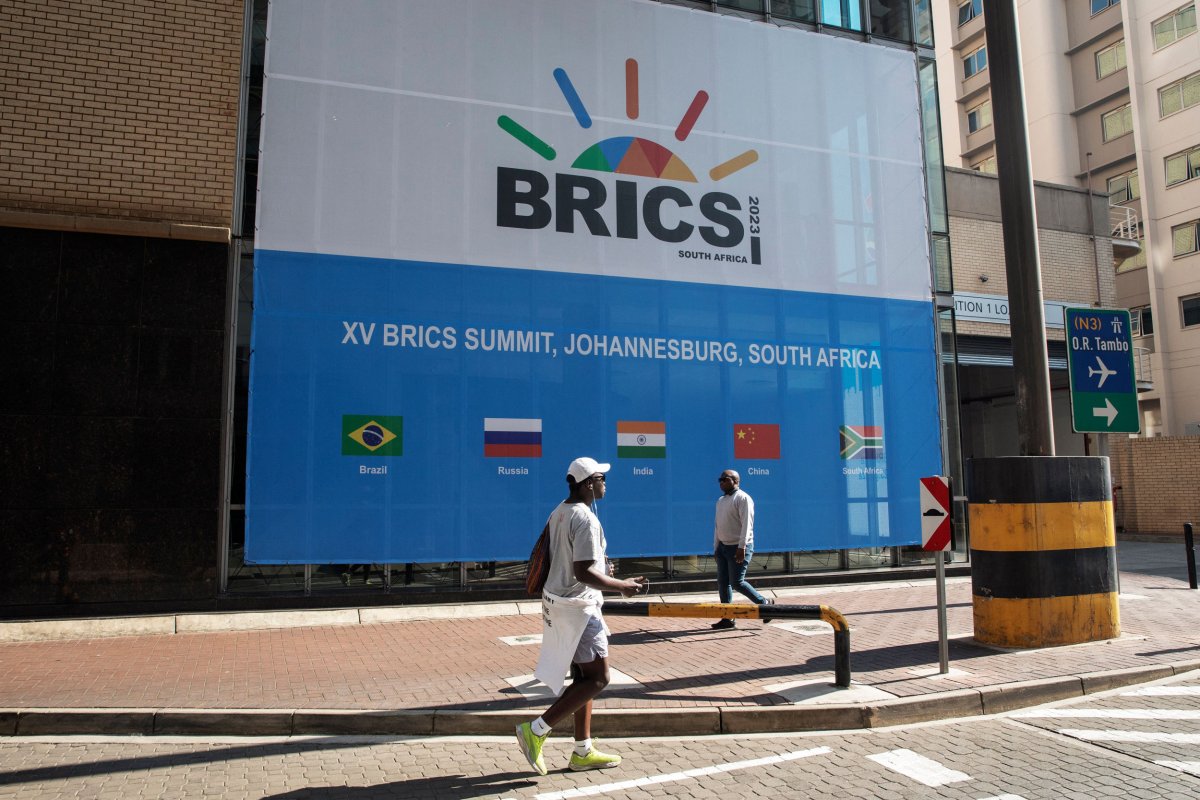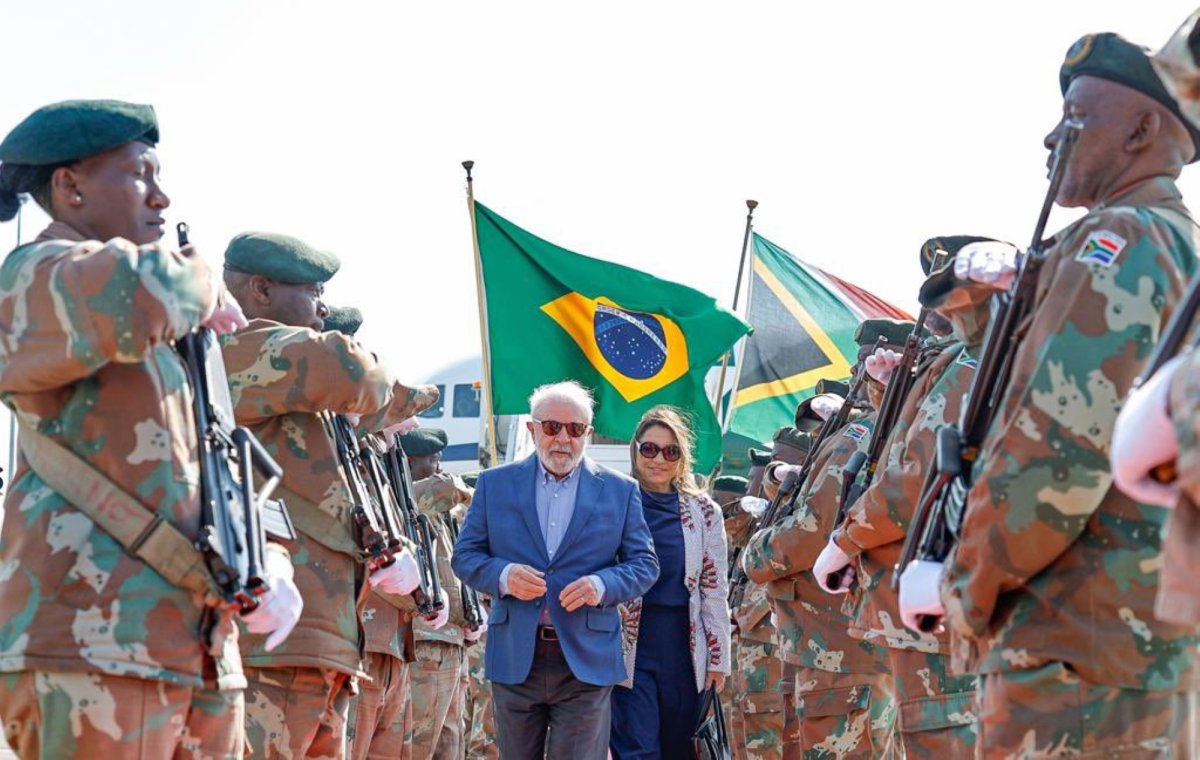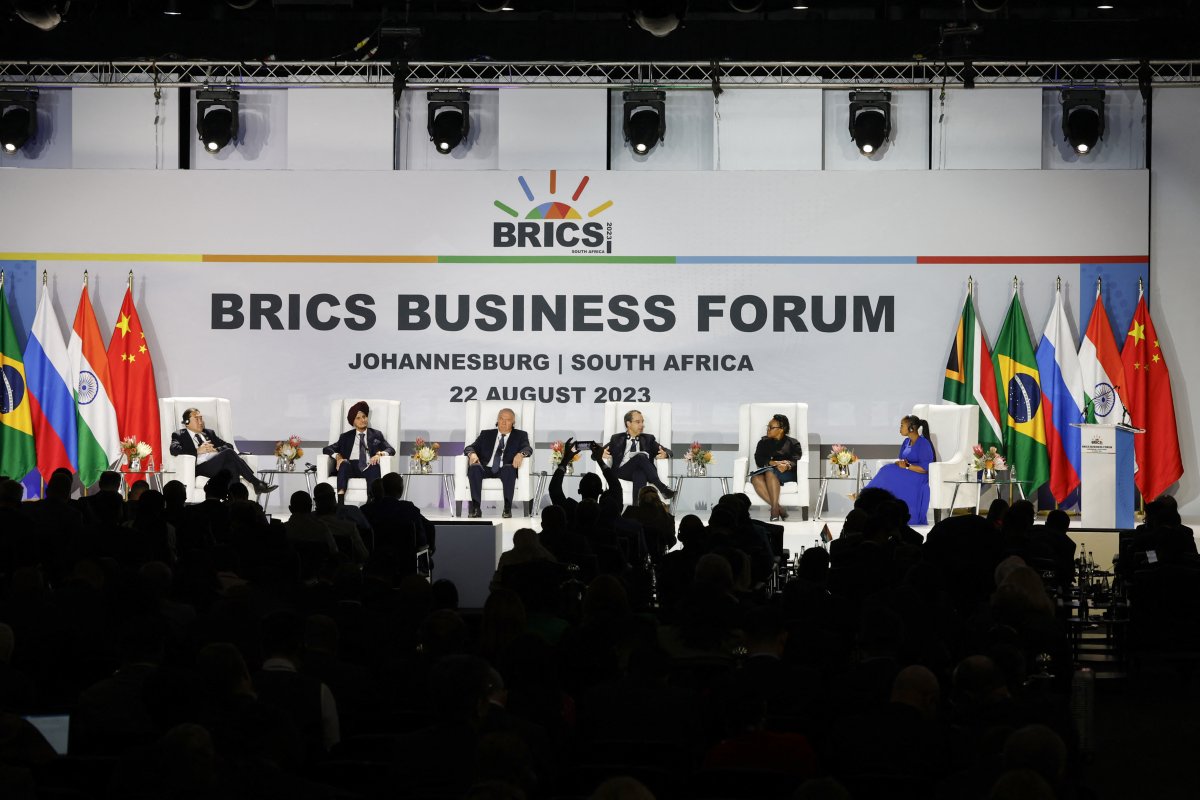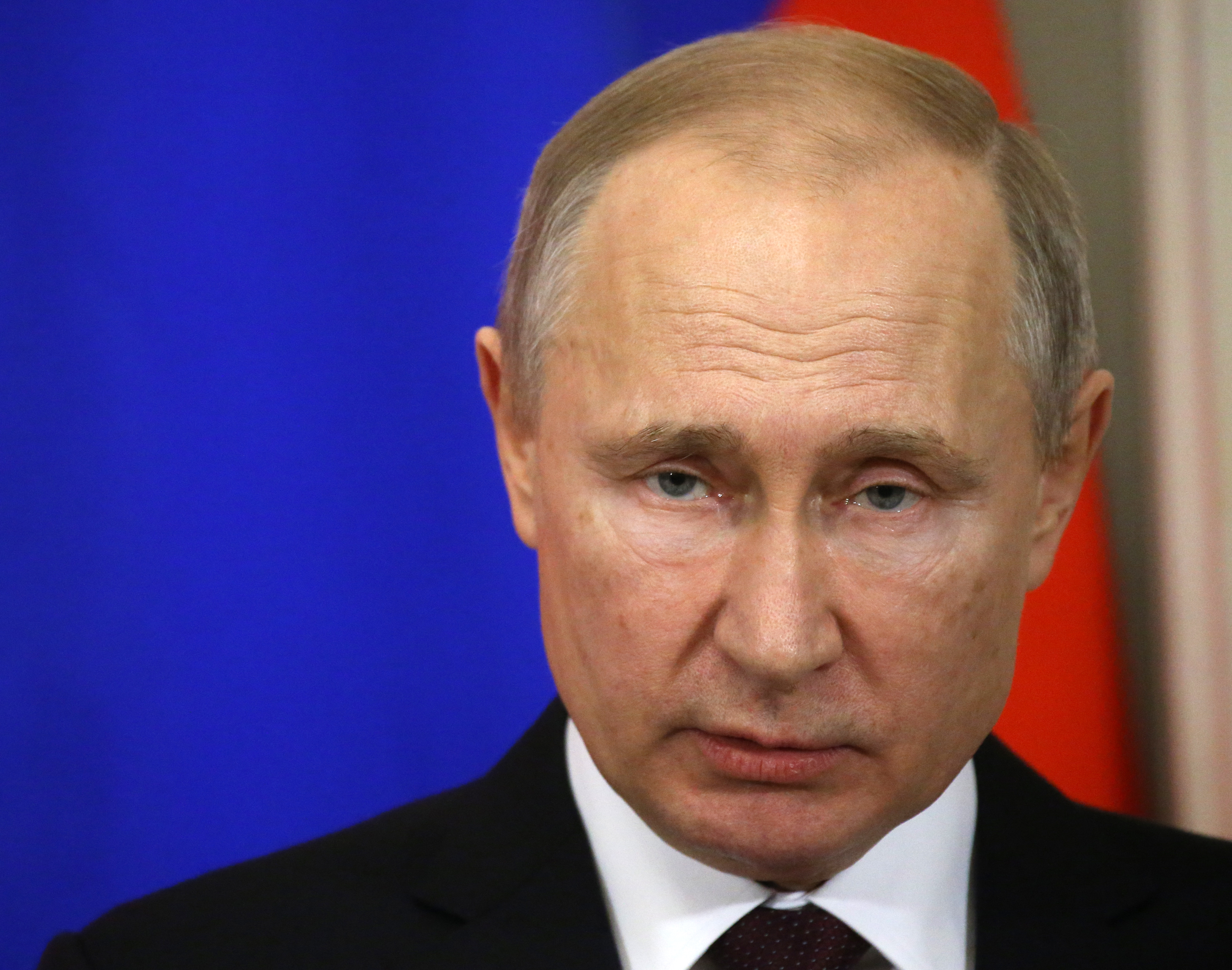While Russian President Vladimir Putin's in-person absence due to international legal troubles looms over the BRICS conference attended by the leaders of fellow member states Brazil, India, China and South Africa, the growing interest in expanding the group to include additional countries from across the globe is likely to cement the bloc's future as a force in global geopolitics.
And with no seat at the table for the United States, the three-day summit that began Tuesday in Johannesburg demonstrates how Washington has struggled to project influence throughout the vast, developing Global South.
"The U.S. is trailing countries such as Russia, India and China in the Global South," Akhil Ramesh, a senior fellow at the Hawaii-based Pacific Forum, told Newsweek. "The Global South does not have this special solidarity it has with nations such as China and India. As victims of Western imperialism/colonialism and having faced similar challenges in reconstruction and development, they have a unique solidarity."
"The U.S. approach continues to be one where they use nations of the Global South as pawns in their future, larger cold/hot conflict with China or Russia," Ramesh added. "This understandably has not helped them win friends."

Such solidarity continues to extend to Putin, who has accelerated his country's outreach to developing nations, especially in Africa, in recent years.
Moscow's overtures have been met with ongoing interest, as evidenced by the recent Russia-Africa Summit in Saint Petersburg. The summit was attended by 16 African heads of state and representatives of 25 additional African countries, even as the West has accused Putin of war crimes, resulting in an International Criminal Court warrant, and of weaponizing food by bombing grain infrastructure and allowing a deal that safeguarded the continued export of Ukrainian grains via the Black Sea to collapse.
U.S. warnings about forging closer economic ties with China have been met with even stiffer resistance, as President Xi Jinping presses on with his ambitious Belt and Road Initiative extending across continents despite a slowing economy at home.
Ramesh argued that nations of the Global South simply "do not view Beijing and Moscow the same way the West does," and instead see new opportunities where traditional mechanisms have failed.
"So, when there was a group presenting an alternative to the Western-led world order/vision of the world," he added, "nations were quick to jump on the bandwagon."
Newsweek has reached out to the U.S. State Department for comment.
Still, obstacles to progress exist within a bloc whose core members already have little alignment in their broader geopolitical goals, while some, especially China and India, have active disputes between them. Such feuds have the potential to only grow as the coalition considers taking on new members, such as Iran and Saudi Arabia.
Others who have applied include Algeria, Argentina, Bahrain, Bangladesh, Belarus, Bolivia, Cuba, Egypt, Ethiopia, Honduras, Indonesia, Kazakhstan, Kuwait, Morocco, Nigeria, the Palestinian National Authority, Senegal, Thailand, the United Arab Emirates, Venezuela and Vietnam, according to the most recent count offered last week by South African Foreign Minister Naledi Pandor.
"Those who are there for the day-to-day negotiations, at least from the Brazilian government side, say it is already very hard to come to consensus when you have China, India and Russia at the table," Ana Elisa Saggioro Garcia, a professor at the Pontifical Catholic University of Rio de Janeiro's Institute of International Relations and general coordinator of the BRICS Policy Center, told Newsweek.
But "there's another side of the story," she said. That's the growing view, including from Brazilian President Luiz Inácio Lula da Silva, that "a strong BRICS" is necessary, and a "strong BRICS is also a big BRICS."

South Africa, the current chair, is the only nation to have been added to what began as an informal BRIC bloc, born out of a term coined by then-Goldman Sachs chief economist Jim O'Neill in 2001 to describe emerging economic powers. Russia led the initiative to bring Brazil, China and India together for the first summit in 2009, and South Africa was admitted the following year.
Initially, BRICS was focused on effecting reform within existing, primarily Western-led economic institutions, such as the International Monetary Fund (IMF), in the wake of the 2008 global financial crisis.
"The first common agenda that they had, despite their differences, was the reform of the international financial architecture," Garcia said. "So, international financial institutions, those grounded in the Bretton Woods Conference, in the post-war period, they do not represent the world anymore. Those huge economies don't have enough voice in those institutions, they need to be reformed. They need to reflect the new configuration of the world economic power."
Gradually, the group became more focused on creating alternative mechanisms, most notably in the establishment in 2014 of the Shanghai-based New Development Bank, which today also counts Bangladesh, Egypt and the United Arab Emirates as members. With this transformation, Garcia explained, "the geopolitical character of BRICS started to be more important and more relevant than only the economic one."
China, in particular, she argued, "has been very clever and very strategic to use this opportunity to advance and to expand another coalition where China is predominant, where China doesn't have to deal with negotiations with Western powers."
But as evidenced by Brazil's enthusiasm for a more active role for BRICS and the growing list of prospective members, it's not all about Beijing.
"BRICS has become this pole of attraction of all countries now who've seen that they can have more power if they ally with a coalition such as BRICS to face measures that the West has been doing for years now," Garcia said, "and also to face these sorts of constraints and repression in terms of worldview and values."
Ryan Berg, director of the Center for Strategic and International Studies' (CSIS) Americas Program in Washington, D.C., also discussed how countries like Brazil were becoming more interested in the geopolitical nature of BRICS as an exercise in "active nonalignment."
"It can heighten the relevance of a country like Brazil, which is sometimes overlooked and feels overlooked and neglected," Berg said in response to Newsweek's question during a CSIS call held in the leadup to the BRICS summit.
"By pursuing this strategy," he explained, "you can basically make it a competition for the affection or for the attention of major world powers or leading world powers that would otherwise overlook Brazil's position on a particular issue."

Speaking on the same call, CSIS Africa Program director Mvemba Phezo Dizolele highlighted the importance of the host nation itself, saying BRICS membership "strengthened the position of South Africa among non-aligned countries" at a polarizing time in global geopolitics.
"Non-aligned countries have absolutely been at odds at least with Western countries, particularly ideologically because they do not want to align either with the Russians or with the United States and allies," Dizolele said.
A key goal for the summit's participants "will be discussing their disillusionment with U.S. leadership or at least the U.S.-led coalition around the world and how that world order is affecting adversely the countries of the Global South," he said, noting that "this will be a time when they will be seeking an alternative to that power."
The phenomenon of a competition among major powers to court the Global South was also observed by Mrityunjay Tripathi, a research fellow at the New Delhi-based Public Policy Research Center who previously served as part of India's delegation to the 2018 BRICS Youth Summit in South Africa.
"U.S. attempts to engage the Global South will only benefit the region, as the U.S. will act as a balancing power in the region dominated by China," Tripathi told Newsweek. "This competition will only benefit the developing economies and the multipolarity of the BRICS will ensure that region remains free and open to all."
Here, he said that "the presence of India adds credibility to BRICS and assures the West that India will act as a balancing power in the alliance that consists of Russia and China."
While New Delhi and Washington have strengthened ties in recent years, this does not mean total alignment in their positions. Tripathi argued that the trends apparent in the summit and context surrounding it show that Washington was on the backfoot in this competition over developing nations.
"The growing interest in BRICS does suggest that the U.S.' attempts to assert influence, particularly across the Global South, have not always produced desired results," Tripathi said. "The rise of BRICS is indicative of a shift in power dynamics from the traditionally Western-dominated world order to a more multipolar global scenario."
A key part of this shift identified by Tripathi was not only expansion, but the vision of "instituting a common currency," something that "further solidifies the group's commitment to long-term sustainable progress of the Global South."
"A common currency will not only boost intra-BRICS trade," he added," but also eliminate the high dollar conversion costs of international transactions."

Shen Shiwei, a journalist and analyst with a background in Chinese business dealings in Africa and the Middle East, argued that "the only thing that can beat the U.S. dollar is the dollar itself, driven by weaponization from Washington."
"The global trend of increasing the use of multiple currencies, instead of fully relying on U.S. dollars, is not a new idea," Shen told Newsweek. "Three decades ago, the euro was created in part because the majority of the EU wanted to move away from its deep reliance on the U.S. dollar."
"The dollar is still essential to global investments and trade," he added, "but the process of de-dollarization is accelerating, mainly because its weaponization has caused an erosion of confidence and alerted emerging economies to take actions to safeguard economic security."
The U.S. dollar continues to command a significant lead against competitors, comprising some 59 percent of the world's foreign exchange reserves. The euro constitutes around 20 percent, with other currencies such as the Japanese yen, the United Kingdom's pound sterling and the Chinese renminbi in the single digits.
Still, a number of countries, particularly members of BRICS, have called for conducting bilateral trade in their own national currencies, and the idea of a common currency has been increasingly put forth. In April, Lula delivered an impassioned speech at the New Development Bank headquarters in which he railed against the notion that "all countries are forced to do their trade backed by the dollar."
The message has continued to gain traction among existing and prospective BRICS members.
"But that doesn't mean BRICS is anti-West," Shen said.
He argued that "the zero-sum game narrative developed in the West that the BRICS was created as competition to the G7 or the Global North is very misleading."
The G7, officially the Group of Seven, is a bloc consisting of the world's largest developed economies, including Canada, France, Germany, Italy, Japan, the United States and the U.K., with participation from the European Union as well. The G7 existed as the G8 until 2014, when it was expelled due to its role in the first major outbreak of conflict in Ukraine.
"All BRICS members have important political and economic cooperation with the G7 countries," Shen said. "More importantly, BRICS doesn't want to copy the Western hegemony in mentality and reality, which has brought too many problems to the Global South."
As opposed to the G7, "the BRICS mechanism has met the demands of the Global South, especially marginalized countries, to advance a collective agenda and push the building of a more inclusive, representative, just and fair global architecture," Shen argued.
"BRICS is not an exclusive club or small circle," he added, "but a big family of good partners."
Uncommon Knowledge
Newsweek is committed to challenging conventional wisdom and finding connections in the search for common ground.
Newsweek is committed to challenging conventional wisdom and finding connections in the search for common ground.
About the writer
Based in his hometown of Staten Island, New York City, Tom O'Connor is an award-winning Senior Writer of Foreign Policy ... Read more
To read how Newsweek uses AI as a newsroom tool, Click here.





